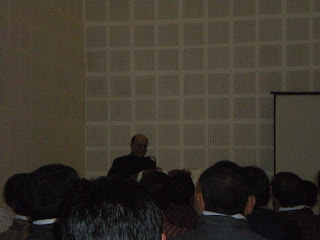Bhutanese democracy came with persistence by His Majesty the King said the Chief Election Commissioner of India His Excellency Shri Navin B. Chawla at a conference on Political Parties: Lessons from Indian Democracy held this afternoon. He said that the process of democratization in Bhutan was gradual, planned, peaceful and orderly.
We all have the right to free speech and expression. We also have the duty to respect other's privacy and reputation.
DISCLAIMER
All the stories posted here are author's personal view and does not reflect anybody's or represent any institutions or organization to which the author is associated unless otherwise mentioned or referred or sources cited after the article. Therefore, any errors are also of the author. Any post which may be directly or indirectly related to any institutions where blogger may be affiliated does not in anyway represent these institutions. Readers may use the information for any educational or research purpose at their own risks on accuracy and authenticity of the information provided herein. The photo(s) from the author's private collection may not be reproduced in any form, electronic or otherwise without prior permission.
The information given here are updated and authenticated to the extent possible and to the best of the knowledge of the blogger and not otherwise.
Anyone wishing to use all or part of the posts published on this blog may kindly obtain permission from the author by emailing at sonamphuentsho111@gmail.com.
NOTE: The blogger is not responsible for any damages caused for whatever reason by using the information posted on this blog unless provided to the user with written permission from the Author.
Tuesday, 27 October 2009
Political Parties: Lessons from India Democracy
Bhutanese democracy came with persistence by His Majesty the King said the Chief Election Commissioner of India His Excellency Shri Navin B. Chawla at a conference on Political Parties: Lessons from Indian Democracy held this afternoon. He said that the process of democratization in Bhutan was gradual, planned, peaceful and orderly.
My Blog


No comments:
Post a Comment